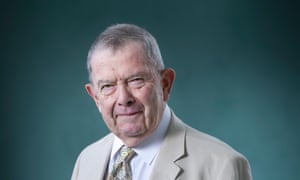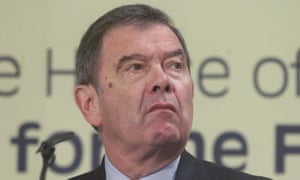
Most people will remember Anthony King, who has died aged 82, from election nights on television, when, following some breathless report of latest developments, he would swiftly, crisply and lucidly dig out their meaning. In 1992, he announced, on the basis of the first two results, that the polls that had been showing John Major on his way to defeat, and even the newly taken exit polls, were wrong, and the Conservatives could look forward to a fourth term in power.
Pronouncements like that were all the __more striking when they came from a source who seemed so calm and judicious, giving a sense of rooted sagacity somehow enhanced by his gentle Canadian accent. Nor did he hedge such forecasts with scholarly caveats. At the next election, won by Labour and Tony Blair, when David Dimbleby talked of a landslide, King said it was __more than that: more like “an asteroid hitting the planet and destroying practically all life on Earth”.
His television following was one of three distinct audiences to whom King devoted his time. The second was that which, as professor of government at Essex University, he addressed in his many books about politics and government. Some were co-authored. He worked with the psephologist David Butler, based at Nuffield College, where King had studied, on the Nuffield histories of the 1964 and 1966 elections.

Later he joined his close friend and Essex University colleague Ivor Crewe to produce SDP: The Birth, Life and Death of the Social Democratic Party (1995) and the bestselling The Blunders of Our Governments (2013). He also wrote British Members of Parliament: A Self-portrait (1974), and Who Governs Britain? (2015), as well as several about US politics. Blunders brought enthusiastic audiences to the book festivals at which he frequently spoke. At one of these, after David Cameron took on the premiership, he was asked whether they would be compiling a further edition to catch up with subsequent blunders, to which he wryly replied that the Cameron team seemed to be writing it for them.
The third audience was again academic and, for King, probably the most valued audience of all: the students he taught for more than 50 years at Essex. David Sanders, the university’s regius professor of political science, said: “Tony was the intellectual heart of the department of government at Essex. His facility for making complex arguments accessible to audiences of all kinds was unparalleled. His personal kindness was immense.”
Long past retirement age, he never sought and was never ushered towards retirement, a process at last formalised by his appointment as millennium professor in 1999.
He made his first appearances on the BBC’s election night broadcasts in the mid-1960s with Butler, whom he replaced as a fixture from 1983 to 2005. There was also his journalism, a kind of halfway house between his TV and academic careers. There were many contributions over the years to newspapers, including this one, but his most regular engagement, from 1984, was with the Daily Telegraph, for which he analysed public opinion both as measured by the polls it published and evidence elsewhere, especially in byelection results.
King was fascinated by newspapers and those who worked in them. The essential quality here, he used to say, was curiosity – something he had himself in abundance, inspiring a wide range of interests. Top of the list came music. This was pursued with a rigour not given to all concert-goers. Even the most feted of conductors, soloists or orchestras were assessed with close scrutiny and often some scepticism.
That went for another passion – conversation – too. He might almost have posted a notice above the door of his home in Wakes Colne, near Colchester: “Unexamined received opinion not welcome here.” Here, as always, King was a teacher. His implied instruction was: read, mark, learn, but do so critically. Sometimes that made him sound censorious. Yet there was ample evidence too, as in the appreciative notes he would send to those whose work pleased him, of that generosity that Sanders saluted.
Travel, and especially walking in company, was another particular pleasure. He and Crewe staged annual walks for friends and colleagues at Essex. Food and drink were preoccupations too, as he demonstrated at the dinner parties that he and his wife, Jan (nee Reece), a university administrator turned life coach, regularly held, with a certain amount of rigorous argument also on the menu.
Born in Toronto, the son of Harold, an art teacher, and his wife, Marjorie, a librarian, Tony went to Queen’s University, Kingston, Ontario, to study history. He came to Britain in the mid-50s armed with a first-class degree to take up a Rhodes scholarship at Magdalen College, Oxford – finishing with another first-class degree in PPE. He began his doctorate at Nuffield College (1958-61) then completed it back at Magdalen (1961-65), as a fellow, during which time he also spent a year at Columbia University, New York (1962-63).
Jan, whom he married in 1980, was his second wife. His first, Vera Korte, whom he married in 1965, died young, in 1971. Thereafter, he became close to Shirley Williams, who describes their association in her autobiography, Climbing the Bookshelves.
At the time, King was newly bereaved and Shirley’s husband, the philosopher Bernard Williams, had left her. She and King, she says, fell in love. She was divorced from Bernard; Tony was a widower; marriage was likely. But Williams was an observant Catholic and her church – as it insisted when she sought its guidance – could not accept a remarriage on the basis of a divorce. Williams sought an annulment, but that process dragged on, and at some point she and King amicably agreed not to marry.
There were other life-determining choices. King could easily have taken a prestige appointment at Oxford, where he was made a senior lecturer in 1966. Yet he revelled in Essex, which made him reader in government in 1968, and the opportunity it gave him to shape a department on the lines that he thought such departments ought to be shaped.
Or he might, like old Oxford friends, have gone into politics. Like Williams and Bill Rodgers he had been Gaitskellite Labour at Oxford. The former both became Labour MPs but left to set up the Social Democratic party. Neither King nor Crewe yearned for an SDP seat at Westminster, but they took a conspicuous part with advice on its early development.
Indeed there was some resentment when their study of the rise and fall of the party was published, partly because people who had taken part in the great adventure felt that Crewe and King had dismissed its achievements too lightly, and partly because, as one of them said on reading the book’s conclusion that it was probably always doomed: “It’s a pity they couldn’t have told us that in the first place.”
King was a member of the Nolan committee on standards in public life in 1994 and the Wakeham commission on the future of the House of Lords in 1999. In 2005 he chaired an inquiry on drugs policy for the Royal Society of Arts.
Strong, sturdy, and resolute, ceaselessly active – there was, as usual with King, a new book on the way when he died – he had hitherto seemed indestructible.
Jan survives him.
• Anthony King, political scientist and broadcaster, born 17 November 1934; died 12 January 2017